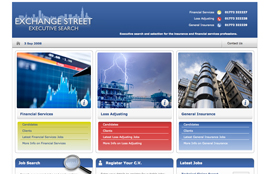Financial Services  0161 973 6900
0161 973 6900
Loss Adjusting & Claims  0161 973 6900
0161 973 6900
General Insurance  0161 793 9761
0161 793 9761
Executive search and selection for the insurance and financial services professions.
Experience V Qualifications

But what of the prospects of the highly experienced claims handler or loss adjuster who has no qualifications to support the market knowledge amassed throughout their career? There remains the problem of a nonqualified candidate who has more technical knowledge that any exam could hope to test being overlooked for a candidate with a professional qualification. Here, an impressive qualification weighted CV displaying good theoretical knowledge can disguise the lack of practical market experience leading to the failure to work effectively and efficiently.
Given the recent rise in the push for school leavers in pursuing higher education before seeking employment, how are employers to differentiate between candidates with only qualification results as a guide? In addition, just because someone has had a career span of a number of years, does that automatically mean that they are capable of performing their role to the expected standard?
Clearly, the question has more emphasis depending upon on the vacancy; individuals applying for a junior claims handler job or trainee loss adjuster job obviously wouldn’t be expected to have the same knowledge of a claims manager/claims technician or established loss adjuster. Here qualification success maybe the only yardstick available. More senior roles will generally involve a mixture of both qualifications and experience in equal measure, with specialist roles having more on an emphasis on experience over education.
So how is this conundrum to be solved? The role of a good recruiter is to aid the employer with invaluable information of each candidate by highlighting their strengths /weaknesses from both an educational and experience perspective, providing a particularly close match between the individual and the vacancy. This is not always possible by reviewing a CV alone and is the biggest ‘value-adding’ aspect a recruiter can play in the process.
Trust is an integral part of this and a company has to truly value the opinion of the recruiter which is why choosing a partner in this process is so important, particularly at a time when competition for loss adjuster jobs and claims handler jobs is as fierce as ever.
Job Search
Search our current jobs and apply online:
“Not only was I amazed at how quickly things happened but also at the communication and information that I received helping me to secure the position. Throughout the term of my contract they were accessible and communicative. I would recommend Exchange Street to anyone and found them to be personal yet very professional.”
Janice - Compliance Contractor, North West








